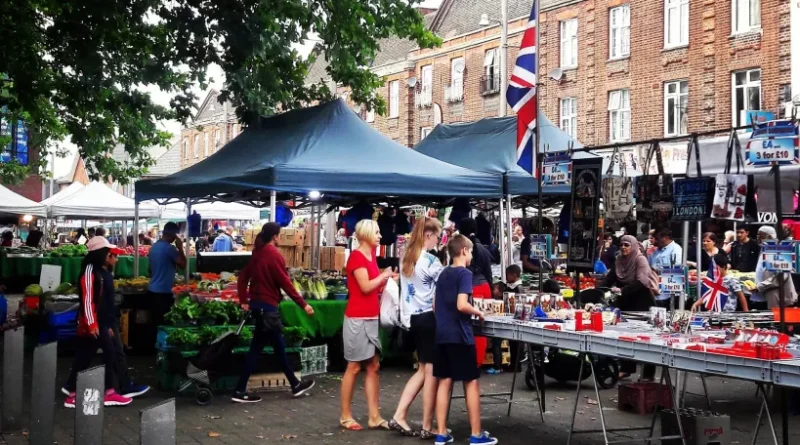History of Walthamstow Market
The Glorious Chaos of Walthamstow Market: A Deep Dive
The History of Walthamstow Market
Walthamstow Market, one of London’s oldest street markets, has been standing tall since 1885. That’s over a century of haggling, bargain-hunting, and the occasional heated debate over the freshness of a tomato. What started as a humble agricultural trading hub has now become a cultural phenomenon.
Back in the 19th century, the market emerged as a trading zone for the local farming community. Farmers and merchants would gather to sell their produce, fresh meats, and dairy. And of course, in classic British fashion, you can bet there was at least one person loudly complaining about the price of potatoes.
As urbanization swept through the area, Walthamstow evolved from a sleepy village into a bustling commercial centre. The Victorian era brought rapid expansion, and the market diversified. From fresh produce to household goods, flowers to fabrics, the variety of wares exploded. It was the Amazon of its time—except you had to walk and interact with actual humans.
The Modern Era of Walthamstow Market
Fast forward to today, and Walthamstow Market has adapted with the times. While you can still find traditional market staples, the addition of street art, crafts, vintage clothing, and trendy food stalls has given it a fresh, hipster-approved makeover. If Victorian traders saw it now, they’d be confused by the artisanal sourdough but delighted by the range of bargains.
The market is still open on Thursdays, Fridays, and Saturdays, and now even on Sundays for those who like to spend their weekends pretending they’re in a scene from ‘EastEnders.’ It continues to serve as both a vital economic hub for locals and an intriguing attraction for tourists, drawn in by its chaotic charm and the prospect of finding something unique (or at least, something they never knew they needed until they saw it).
The Economic Powerhouse That Is Walthamstow Market
Walthamstow Market isn’t just a collection of stalls—it’s a mini economic engine that keeps the local community ticking. Think of it as a business school in action, where the main curriculum is supply and demand, and the final exam is convincing someone that their life is incomplete without a novelty phone case.
Originally rooted in agriculture, the market expanded its horizons with the urban boom. Locals started selling more than just food—apparel, home goods, and gadgets soon joined the mix. This shift transformed the market into a financial powerhouse, generating jobs and offering small-scale entrepreneurs a chance to thrive. And let’s be honest, no one hones their negotiation skills better than a market trader.
Tourism has also played a role in Walthamstow’s economic growth. Visitors from all over flock to experience its unique character, spending money on everything from vintage furniture to street food. This, in turn, supports the wider local economy—including hospitality businesses, transport services, and even the occasional pub benefitting from weary shoppers in need of a pint.

The Political Playground of Walthamstow Market
If Walthamstow Market had a motto, it would be: “Come for the bargains, stay for the political drama.” Over the years, it has been a battleground for political debates, campaign rallies, and the odd protest that usually features at least one person shouting into a megaphone.
Political candidates love a good market visit—it’s the perfect place to shake hands, kiss babies, and pretend they understand the price of a loaf of bread. The market’s central location and high foot traffic make it an irresistible stage for campaigners looking to spread their message (or, depending on your perspective, get in the way of your shopping).
It’s also been a hub for labour movements and workers’ rights activism. Unions and activists have historically used the market as a rallying point to fight for better wages and working conditions. Even today, you might find passionate individuals handing out leaflets, hoping to spark discussions about social justice, environmental policies, or why the council still hasn’t fixed that one pothole everyone’s been complaining about.
The Social Heart of Walthamstow Market
Walthamstow Market isn’t just a collection of stalls—it’s a mini economic engine that keeps the local community ticking. Think of it as a business school in action, where the main curriculum is supply and demand, and the final exam is convincing someone that their life is incomplete without a novelty phone case.
Originally rooted in agriculture, the market expanded its horizons with the urban boom. Locals started selling more than just food—apparel, home goods, and gadgets soon joined the mix. This shift transformed the market into a financial powerhouse, generating jobs and offering small-scale entrepreneurs a chance to thrive. And let’s be honest, no one hones their negotiation skills better than a market trader.
Tourism has also played a role in Walthamstow’s economic growth. Visitors from all over flock to experience its unique character, spending money on everything from vintage furniture to street food. This, in turn, supports the wider local economy—including hospitality businesses, transport services, and even the occasional pub benefitting from weary shoppers in need of a pint.
The Cultural Tapestry of Walthamstow Market
If Walthamstow Market were a person, it would be that one friend who knows everyone and always has a story to tell. Its cultural history is rich, reflecting the area’s evolving identity through the years.
Traders have brought their traditions and craftsmanship to the market, creating a vibrant mix of artisanal products. Handmade jewellery, textiles, and artwork sit alongside everyday essentials, making each visit a treasure hunt. And let’s not forget the street performers and musicians who add a soundtrack to the shopping experience—whether you like it or not.
The market has also been the backdrop for festivals and community events, celebrating everything from seasonal holidays to local heritage. It’s more than just a place to buy things; it’s a cultural institution that keeps Walthamstow’s spirit alive.

The Benefits of Walthamstow Market
Aside from being a great place to practice your bargaining skills, Walthamstow Market offers numerous benefits to the community.
Economically, it provides employment and business opportunities, helping small enterprises flourish. Socially, it fosters a sense of belonging and community pride, proving that markets are about more than just commerce—they’re about connections.
It’s also a fantastic tourist attraction. Visitors get a taste of London’s real, unfiltered charm, far removed from the polished, postcard-perfect landmarks. Here, they experience the capital’s true character—one that’s loud, lively, and occasionally involves a stallholder convincing you that you need a second-hand DVD player in 2025.
In conclusion, Walthamstow Market isn’t just a shopping destination; it’s a historic, economic, political, social, and cultural phenomenon. Whether you’re here for the bargains, the banter, or the unexpected street performance, one thing’s for certain—you’ll leave with a story to tell. And probably a bag full of things you didn’t plan to buy.




